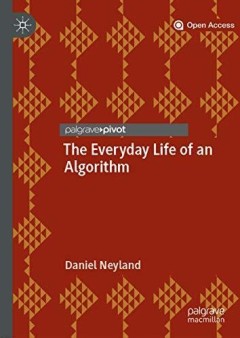Filter by

Agricultural Implications of Fukushima Nuclear Accident (IV)
This open access book presents the findings from on-site research into radioactive cesium contamination in various agricultural systems affected by the Fukushima Daiichi Nuclear Power Plant accident in March 2011. This fourth volume in the series reports on studies undertaken at contaminated sites such as farmland and forests, focusing on soil, water, mountain, agricultural products, and animal…
- Edition
- 1
- ISBN/ISSN
- 978-981-19-9361-9
- Collation
- XIII, 276
- Series Title
- -
- Call Number
- -

Bruno Latour in the Semiotic Turn : An Inquiry into the Networks of Meaning
This open access book highlights the link between Bruno Latour's works and the semiotic perspective on social phenomena analysis. It identifies and relaunches a dialogue that was as heated as it was fruitful, but still little recognized within the social sciences. It asks why the theory of signification has so far been only sporadically acknowledged in literature derived from Latour's work. Sta…
- Edition
- -
- ISBN/ISSN
- 978-3-031-57178-7
- Collation
- VIII, 113
- Series Title
- SpringerBriefs in Sociology (BRIEFSSOCY)
- Call Number
- -

Low-Dose Radiation Effects on Animals and Ecosystems : Long-Term Study on the…
This open access book summarizes the latest scientific findings regarding the biological effects of the Fukushima Daiichi Nuclear Power Plant (FNPP) accident in 2011. Various cases of changes in animals and organisms have been reported since the FNPP accident. However, it is often unknown whether they are actually due to radiation, since the dose or dose-rate are not necessarily associated w…
- Edition
- 1
- ISBN/ISSN
- 9789811382185
- Collation
- XV, 264 hlm,: ill, lamp;
- Series Title
- -
- Call Number
- -

Ecosystem Restoration through Managing Socio-Ecological Production Landscapes…
This Open Access book series aims to make timely and targeted contributions for decision-makers and on-the-ground practitioners by producing knowledge concerning “socio-ecological production landscapes and seascapes” (SEPLS) – areas where production activities help maintain biodiversity and ecosystem services in various forms while sustainably supporting the livelihoods and well-b…
- Edition
- -
- ISBN/ISSN
- 9789819912926
- Collation
- -
- Series Title
- -
- Call Number
- -

Logischer Empirismus, Lebensreform und die deutsche Jugendbewegung: Logical E…
This open-access book is the first to investigate the roots of Logical Empiricism in the context of the Life Reform and the German Youth Movements. Rudolf Carnap and Hans Reichenbach are the key protagonists; they both belonged to the German Youth Movement and developed their early philosophical views in this setting. By combining scholarly essays with unpublished and hard to access manuscripts…
- Edition
- -
- ISBN/ISSN
- 978-3-030-84887-3
- Collation
- X, 356
- Series Title
- -
- Call Number
- -

Inquisitive Logic: Consequence and Inference in the Realm of Questions
This open access book makes a case for extending logic beyond its traditional boundaries, to encompass not only statements but also also questions. The motivations for this extension are examined in detail. It is shown that important notions, including logical answerhood and dependency, emerge as facets of the fundamental notion of entailment once logic is extended to questions, and can therefo…
- Edition
- Volume 60
- ISBN/ISSN
- 978-3-031-09705-8
- Collation
- XX, 272
- Series Title
- -
- Call Number
- -

The Logical Writings of Karl Popper
This open access book is the first ever collection of Karl Popper's writings on deductive logic. Karl R. Popper (1902-1994) was one of the most influential philosophers of the 20th century. His philosophy of science ("falsificationism") and his social and political philosophy ("open society") have been widely discussed way beyond academic philosophy. What is not so well known is that Poppe…
- Edition
- 1
- ISBN/ISSN
- 978-3-030-94926-6
- Collation
- XXIV, 552
- Series Title
- -
- Call Number
- -

Advances in Proof-Theoretic Semantics
This volume is the first ever collection devoted to the field of proof-theoretic semantics. Contributions address topics including the systematics of introduction and elimination rules and proofs of normalization, the categorial characterization of deductions, the relation between Heyting's and Gentzen's approaches to meaning, knowability paradoxes, proof-theoretic foundations of set theory, Du…
- Edition
- Ed. 1
- ISBN/ISSN
- 978-3-319-22686-6
- Collation
- VI, 283
- Series Title
- Trends in Logic
- Call Number
- 511.3 ADV a

The Everyday Life of an Algorithm
This open access book begins with an algorithm–a set of IF…THEN rules used in the development of a new, ethical, video surveillance architecture for transport hubs. Readers are invited to follow the algorithm over three years, charting its everyday life. Questions of ethics, transparency, accountability and market value must be grasped by the algorithm in a series of ever more demanding for…
- Edition
- 1
- ISBN/ISSN
- 9783030005788
- Collation
- IX, 151 hlm; ill., lamp.,
- Series Title
- -
- Call Number
- -

Variant Construction from Theoretical Foundation to Applications
This open access book presents theoretical framework and sample applications of variant construction. The first part includes the components variant logic, variant measurements, and variant maps, while the second part covers sample applications such as variation with functions, variant stream ciphers, quantum interference, classical/quantum random sequences, whole DNA sequences, and multiple-va…
- Edition
- 1
- ISBN/ISSN
- 9789811322822
- Collation
- XXIV, 409 hlm,: ill, lamp;
- Series Title
- -
- Call Number
- -
 Computer Science, Information & General Works
Computer Science, Information & General Works  Philosophy & Psychology
Philosophy & Psychology  Religion
Religion  Social Sciences
Social Sciences  Language
Language  Pure Science
Pure Science  Applied Sciences
Applied Sciences  Art & Recreation
Art & Recreation  Literature
Literature  History & Geography
History & Geography